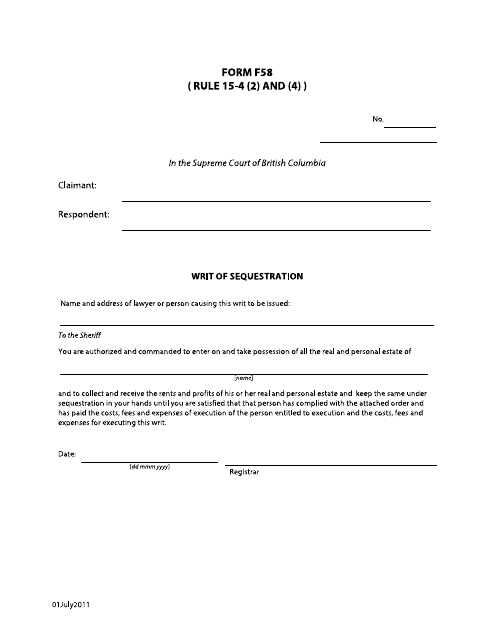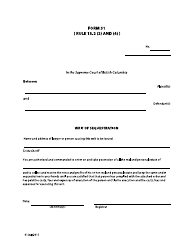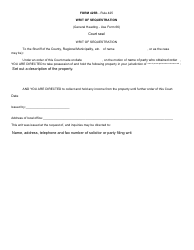Form F58 Writ of Sequestration - British Columbia, Canada
Form F58 Writ of Sequestration in British Columbia, Canada is used to allow a party to seize and hold specified property as security for a debt or claim. It is a legal tool used for enforcing judgments or obtaining security.
In British Columbia, Canada, the person or party who wishes to obtain a Writ of Sequestration must file the Form F58 with the Supreme Court of British Columbia.
FAQ
Q: What is a Form F58 Writ of Sequestration?
A: Form F58 Writ of Sequestration is a legal document used in British Columbia, Canada, to enable a creditor to seize and secure the assets of a debtor to satisfy a judgment debt.
Q: Who can initiate a Form F58 Writ of Sequestration?
A: Only a creditor who has obtained a judgment against a debtor can initiate a Form F58 Writ of Sequestration.
Q: What is the purpose of a Form F58 Writ of Sequestration?
A: The purpose of a Form F58 Writ of Sequestration is to secure the assets of a debtor by appointing a sequestrator who takes control of the debtor's assets and holds them until the debt is paid.
Q: How does a Form F58 Writ of Sequestration work?
A: Once a Form F58 Writ of Sequestration is issued, the sequestrator identifies and seizes the debtor's assets in order to prevent the debtor from disposing of them. The sequestered assets are then held by the sequestrator until the debt is satisfied.
Q: What happens after a Form F58 Writ of Sequestration is issued?
A: After a Form F58 Writ of Sequestration is issued, the sequestrator serves a copy of the writ on the debtor and takes control of the sequestered assets. The sequestrator then proceeds to sell the assets and use the proceeds to pay off the creditor's debt.
Q: Are there any limitations to the use of a Form F58 Writ of Sequestration?
A: Yes, there are certain limitations to the use of a Form F58 Writ of Sequestration. For example, certain assets may be exempt from seizure, and the writ cannot be used against certain types of debtors such as governmental entities.
Q: What happens if the debtor does not have enough assets to satisfy the debt?
A: If the debtor does not have enough assets to satisfy the debt, the sequestrator may still proceed with the sale of the available assets and distribute the proceeds among the creditors according to their priority.
Q: Can a debtor challenge a Form F58 Writ of Sequestration?
A: Yes, a debtor can challenge a Form F58 Writ of Sequestration by applying to the court for a stay or discharge of the writ on certain grounds, such as improper service or lack of grounds for the writ.
Q: Is a Form F58 Writ of Sequestration applicable in all provinces in Canada?
A: No, the Form F58 Writ of Sequestration is specific to the province of British Columbia in Canada and may have variations or equivalents in other provinces.



